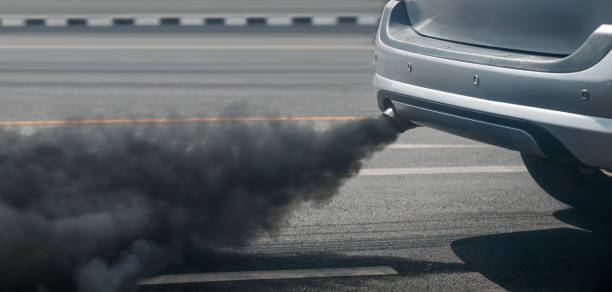Sometimes smoke from our exhaust pipe can be a cause for concern; if you’ve ever noticed smoke billowing out from your Hyundai’s exhaust pipe while driving, you probably wondered about its implications for your vehicle’s health and performance.
You may initially worry that your car is about to break down which could lead to a concerning repair bill. However it’s important to remember that not all instances of exhaust smoke indicate engine failure.
The color of the smoke can actually indicate issues. While some are harmless others should be taken seriously. It’s crucial to understand how different smoke colors in car engines can help determine whether a repair is an issue or a potential risk that requires attention.
Read on to find out what the various exhaust smoke colors mean on Hyundai cars so you know what action is needed.
White Exhaust Smoke
White smoke coming from your tailpipe as you drive is typically nothing to worry about on Hyundais. Often, it’s just water vapor condensing out as engine temperatures change. This steam disperses quickly without any lingering smell.
However, if your Hyundai blows thick white clouds that don’t dissipate, it could indicate an engine coolant leak. The sweet-smelling steam comes from coolant making its way into the combustion chambers and exiting via the exhaust.
Left alone, this can lead to overheating or cracking cylinder heads. Schedule service to identify and address the leak source right away.
Blue Exhaust Smoke
While brief puffs of blue smoke at startup or acceleration are no big deal, consistent blue smoke signals burning engine oil. On Hyundais, common causes include bad valve stem seals, worn turbocharger shaft seals, damaged piston rings, or clogged positive crankcase ventilation (PCV) valves.
Driving with blue smoke can quickly drain oil levels, further damaging internal components. What to do in cases of blue exhaust smoke? Have your Hyundai checked immediately to resolve the root causes.
Black Exhaust Smoke
Black smoke typically means one of two things on Hyundais – either rich fuel mixtures in gasoline engines or diesel particulate filter issues. Continuous black smoke from your gas-powered Hyundai’s tailpipe indicates too much fuel and not enough air for proper ignition.
This incomplete combustion results in unburned gas exiting as thick black emissions. Probable culprits are malfunctioning fuel injectors, air filters, or mass airflow sensors.
Whereas on diesel Hyundais, temporary black smoke while accelerating hard or climbing hills is normal during the self-cleaning regeneration cycle of the diesel particulate filter. Consistent heavy black smoke however signals filter blockages requiring immediate servicing to prevent irreparable damage from excessive exhaust back pressure.
Gray Exhaust Smoke
Smoke from your tailpipe that looks dark gray or charcoal-colored spells trouble. On Hyundais, gray exhaust smoke most commonly stems from excess oil making its way into the combustion process.
Oil leaks past worn valve seals, turbo seals, or piston rings into the cylinders, gets partially burned, and exits as grayish smoke once the engine gets hot. This needs prompt diagnosis to identify necessary repairs before engine performance deteriorates further.
Why You Shouldn’t Drive With Exhaust Issues
While smoke coming from your Hyundai’s tailpipe may seem harmless, exhaust issues should never be ignored. Driving with any noticeable exhaust problems can cause extensive damage over time along with safety and environmental hazards. Here’s what’s at stake if you continue racking up miles with a faulty exhaust:
- Catalytic converter failure from oxygen sensor issues sending unburnt fuel
- Accelerated engine wear without properly venting blow-by gasses
- Stalling and loss of power at critical moments without muffling backpressure
- Poisoning the air for yourself and other drivers breathing tailpipe emissions
- Risking flammability if combustible gasses aren’t safely dissipated
How to Maintain Your Hyundai Exhaust from Smoking
Maintain Air Flow Efficiency
The best way to keep your Hyundai’s exhaust pipe from spewing out smoke is to follow a proactive maintenance routine focused on the vehicle’s critical combustion and emissions components. Start with the air filter, fuel injectors, and spark plugs – these elements mix air and fuel for the engine to properly ignite.
Following Hyundai’s guidelines, routinely inspect filters for dirt buildup, replace fouled spark plugs, and check injectors for clogging or leakage. Sticking to factory-recommended intervals for changing these parts ensures peak working order for complete fuel ignition and minimal exhaust particulates.
Prevent Oil Contamination
Additionally, be diligent about oil changes. Used motor oil contains metal shavings and carbon deposits from internal friction and blow-by gasses created during combustion. Letting this contaminated oil recycle within the chambers risks smoke-producing oil leaks past worn seals and turbo bearings.
Drain the oil promptly every 5,000 to 7,500 miles in gas Hyundais, and replace it with fresh oil to maintain viscosity integrity for tighter seals. Keeping both oil and emission components in their optimal states minimizes opportunities for exhaust smoke before it occurs.
Address Issues Early
Addressing minor issues early on also prevents cascading into major repairs down the road. A faulty oxygen sensor seems easily ignored until it allows raw fuel dumpage that upsets catalytic converter chemistry. Ignore a PCV valve stick and suddenly positive crankcase pressure blows seals.
Little leaks become big leaks resulting in billowing smoke signals. Catch problems in their infancy through active monitoring. Diagnose and check engine lights without delay and cross-reference for unusual sounds pointing to exhaust leaks.
Your attentiveness safeguards a lifetime of clear cruising for that precious Hyundai. Staying one step ahead of trouble ensures carefree confidence in every twist of the ignition key.
In conclusion, protect your Hyundai, the public, and your wallet by acting quickly at the first sign of exhaust irregularities. Our certified Hyundai technicians have the latest diagnostic tools and OEM parts to accurately assess issues and make all necessary exhaust repairs. Schedule an appointment so we can determine why smoke is coming from your Hyundai’s tailpipe and get you safely back on the road.

